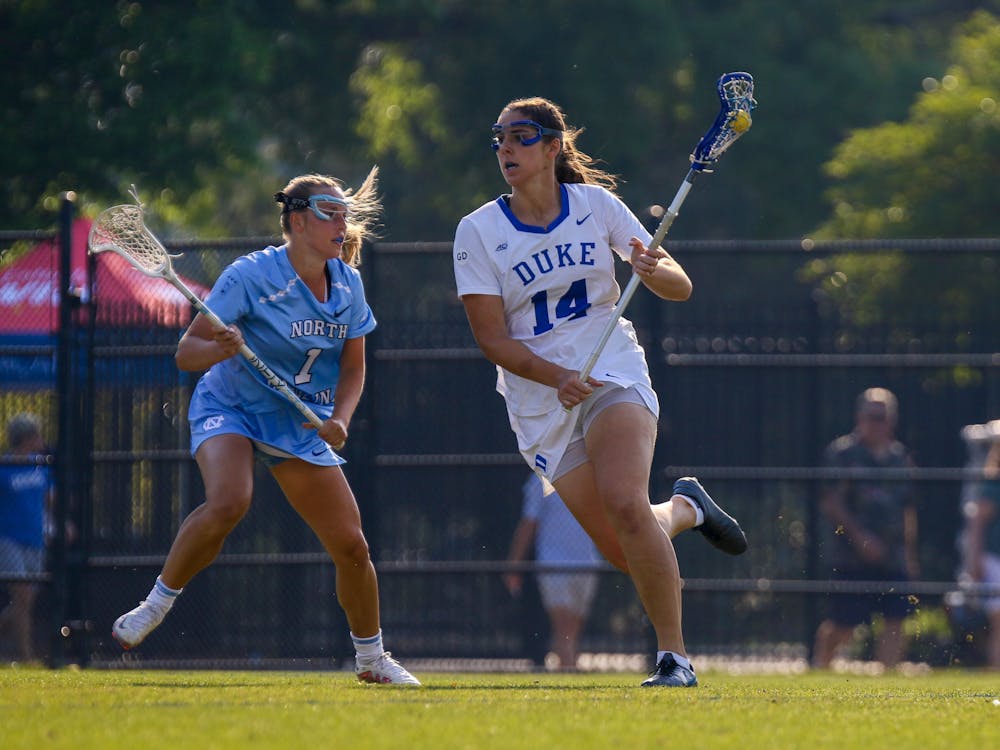After a fairytale regular-season run in 2022, Duke began the 2023 season with a No. 11 ranking and conference — and national — title hopes. With Tewaaraton Award nominee and First Team All-American Maddie Jenner, the draw control queen, star goalkeeper Sophia LeRose and attackers Anna Callahan and Eva Greco all returning for fifth years, the Blue Devils’ losses seemed minimal. They were poised for greatness, teetering on the brink of ACC success.
The expectations ignored Duke’s collapse in Chapel Hill to end the regular season, its conference tournament destruction at the hands of Notre Dame and its quick second-round exit from the NCAA tournament.
After three solid nonconference wins to open its season, including a 24-1 victory against Gardner-Webb in which Jenner became the NCAA all-time draw leader, the Blue Devils headed up to Chestnut Hill, Mass. They had beaten Boston College the season prior in epic fashion, seemingly proving their validity as a contender. Less than a year later, they were primed to do the exact same thing.
Duke trailed just 38 seconds in and was never able to catch back up, losing 17-8.
It beat Liberty at home days later, but fell again March 4 to Notre Dame. From there, the dominos just kept on falling. The Blue Devils lost four straight, three of which were ACC contests, before beating East Carolina and finally tallying their first conference win against Pittsburgh. They would lose the remainder of their regular-season conference matches, their 1-8 ACC record putting them second-to-last in the rankings and marking the worst finish in years.
So, what happened?
Last season, Duke took 9.9 more shots per game than its opponents. It didn’t allow woman-down goals, caused nearly as many turnovers as it gave up and utterly dominated in the draw circle. This season, while it still won the majority of possessions, every other margin was tightened or flipped. The biggest difference is in its turnover numbers. In 2022, while playing two more games, the Blue Devils committed 285 turnovers to their opponents’ 300, 231 of which were caused. In 2023 they still gave the ball away 272 times to their opponents’ 258, only causing 191 of those.
All in all, Duke played messier. It was losing precious possessions while its offensive efficiency was decreasing.
More than efficiency, the Blue Devils lacked offensive power. In 2022 the one-two punch of Catriona Barry and Katie DeSimone combined for 116 goals and 178 points. DeSimone’s own numbers dipped from 85 points last season to 66 this season. Barry’s production was simply lost after the fifth-year’s departure.
That is not to say new pieces didn’t emerge in her place. Senior Caroline DeBellis and sophomore Carly Bernstein both saw their stats skyrocket as each put up 20-goal seasons. However, their improvement alone wasn’t enough to keep Duke in the national spotlight.
The Blue Devils are losing some big names this offseason. Jenner has been the face of the program for four years — since her sister graduated — and without a finalized list of returning seniors, next season is ripe with uncertainty. The program has been relying on its veterans since the pandemic, preaching experience as the be-all-end-all, the final key to Duke’s success. But those veterans are gone now, and it must turn to its new generation of leaders.
The star-studded class of Kennedy Everson, Kerry Nease, Reilly Traynor and Bernstein will be upperclassmen. The freshmen will be looking to step up. With only three rising seniors, DeSimone, Katie Keller and Maddie McCorkle, the Blue Devils have to change their narrative.
Before the 2022 season, head coach Kerstin Kimel said of her incoming freshman class: “They're working their tails off right now to put themselves in position to contribute this year.” Traynor and Everson were the only two to play meaningful minutes that season.
Those young guns are no longer the young ones. They are the class that needs to step up and fill the legacy-sized shoes that their former leaders are leaving behind. They need to be those veterans, those experienced players for the new freshman class to learn from. Duke is in for a changing of the guard, and the success of that transition lies firmly on those middle two years. Their talent is undeniable, but for the Blue Devils to return to national prominence, they need to become the players that the women before them were.
Get The Chronicle straight to your inbox
Sign up for our weekly newsletter. Cancel at any time.

Rachael Kaplan is a Trinity senior and a senior editor of The Chronicle's 120th volume.

